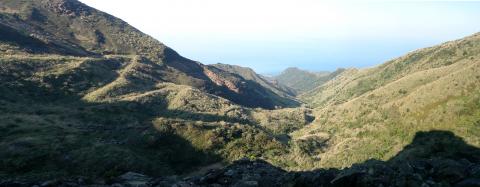Illegal miners have carted away up to NT$7 million (US$235,650) of gold from closed mines in New Taipei City’s (新北市) Jin Jiu area in the past five years, local residents say.
The Jin Jiu area, encompassing Jinguashih (金瓜石) and Jiufen (九份) in New Taipei City’s Ruifang District (瑞芳), was once a major gold-mining area until it was closed down by the Taiwan Metals Mining Company in 1987.
However, a geological survey conducted by a survey team from mining companies in Australia, South Africa, the US and Canada five years ago estimated that there was still about NT$200 billion — or about 200 tonnes — worth of gold left in the Jinguashih area, leading to a number of reports of illegal mining over the past five years.

Photo: Wu Liang-yi, Taipei Times
The Taiwan Metals Mining Company started mining the gold at Jinguashih after Japan surrendered in World War II, but rising costs of gold mining soon led the company to start up copper mining to compensate. Plummeting international prices for copper in the 1980s put the company in decline and it finally closed in 1987. The lands around the mining areas were turned over to the Taiwan Sugar Corp (Taisugar) for maintenance.
A geological survey conducted by National Taipei University of Technology associate engineering professor Yu Bing-sheng (余炳盛) showed that the area still held rich gold veins.
Out of the more than 4,000 samples he took, a tonne of rock usually held several hundred grams of gold, as well as other materials such as silver and copper, Yu’s survey found.
Eighty-year-old Chen Shih-cheng (陳石成), a retired miner living in the area, said earlier this week that strangers were often seen around the closed-down mine areas with semi-trucks and tools, adding that the strangers did not look like researchers or surveyors and were probably illegal miners.
A small path, obviously well-traversed, can be seen around the Niu Fu vein located at an altitude of 500m. While local residents said the vein’s four entrances had been sealed for 20 years by Taisugar, the seals have all been broken. There are also other signs — abandoned bottles and a small lean-to near one of the entrances — which the local residents said were evidence of illegal miners.
The locals say usually only about three months of the year were favorable for mining, and two strong men would be able to carry away 100kg of raw ore per day.
With between 50g and 100g of gold per tonne, and gold averaging about US$1,500 per ounce over the past five years, local residents estimate that illegal miners have carried away between NT$3 million and NT$7 million in the past five years.
Taisugar said entry into the old mines was prohibited, adding that there were many vertical shafts in the mines that would be impossible to climb out of if someone fell in.
The company periodically sends two people to patrol the mountains, but the total area of the land — about 2,000 hectares — is so large the company cannot monitor everything, Taisugar said.
The local police department said that they have also heard rumors that there were strangers dallying around the old mines and even leaving with mineral-bearing rocks, adding that they were unsure if it indicated long-term illegal mining.
The police said they had not received any reports of stolen goods.
The Bureau of Mines at the Ministry of Economic Affairs said that illegal mining was punishable by up to five years in prison and fines of between NT$200,000 and NT$1 million.
The bureau’s Ruifang District security personnel said that it was not easy to illegally mine gold these days, adding that the rumors of illegal mining were unsubstantiated.

Costa Rica sent a group of intelligence officials to Taiwan for a short-term training program, the first time the Central American country has done so since the countries ended official diplomatic relations in 2007, a Costa Rican media outlet reported last week. Five officials from the Costa Rican Directorate of Intelligence and Security last month spent 23 days in Taipei undergoing a series of training sessions focused on national security, La Nacion reported on Friday, quoting unnamed sources. The Costa Rican government has not confirmed the report. The Chinese embassy in Costa Rica protested the news, saying in a statement issued the same

Temperatures in New Taipei City’s Sindian District (新店) climbed past 37°C yesterday, as the Central Weather Administration (CWA) issued heat alerts for 16 municipalities, warning the public of intense heat expected across Taiwan. The hottest location in Taiwan was in Sindian, where the mercury reached 37.5°C at about 2pm, according to CWA data. Taipei’s Shilin District (士林) recorded a temperature of 37.4°C at noon, Taitung County’s Jinfeng Township (金峰) at 12:50 pm logged a temperature of 37.4°C and Miaoli County’s Toufen Township (頭份) reached 36.7°C at 11:40am, the CWA said. The weather agency yesterday issued a yellow level information notice for Taipei, New

Taiwan’s Liu Ming-i, right, who also goes by the name Ray Liu, poses with a Chinese Taipei flag after winning the gold medal in the men’s physique 170cm competition at the International Fitness and Bodybuilding Federation Asian Championship in Ajman, United Arab Emirates, yesterday.

A year-long renovation of Taipei’s Bangka Park (艋舺公園) began yesterday, as city workers fenced off the site and cleared out belongings left by homeless residents who had been living there. Despite protests from displaced residents, a city official defended the government’s relocation efforts, saying transitional housing has been offered. The renovation of the park in Taipei’s Wanhua District (萬華), near Longshan Temple (龍山寺), began at 9am yesterday, as about 20 homeless people packed their belongings and left after being asked to move by city personnel. Among them was a 90-year-old woman surnamed Wang (王), who last week said that she had no plans